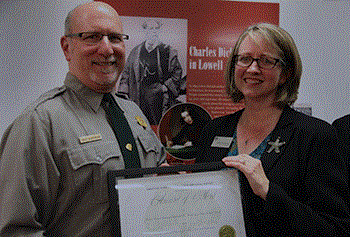Award-Winning Project Continues With Permanent Components

12/12/2013
By Julia Gavin
For seven months in 2012 and 2013, Charles Dickens came back to Lowell.
“Dickens in Lowell” was a series of events, exhibits and projects celebrating the bicentenary of the author’s visit to the bustling city. While Dickens toured the mills and met workers, visitors to the modern celebration learned about his life and the historical context for his work.
The project was co-curated by Assoc. Prof. Diana Archibald of the English department and David Blackburn, chief of cultural resources and programs at the Lowell National Historical Park (LNHP). The park hosted the main attraction, an installation about the author’s life called "Dickens and Massachusetts: A Tale of Power and Transformation". The exhibit won a “Leadership in History” award from the American Association for State and Local History and attracted thousands of visitors.
“This was an excellent collaboration with many organizations, students and faculty and staff members,” says Archibald, who had more than 60 students help with the project from planning to execution. “It’s important to use international figures like Dickens and Jack Kerouac to connect people to the richness of Lowell.”
In addition to the University and the park, “Dickens in Lowell” was sponsored by the Tsongas Industrial History Center, Worcester Polytechnic Institute and the Charles Dickens Museum London, and with support from the Theodore Edson Parker Foundation and the UMass President’s Office.
Archibald earned the largest grant in 2011 from the UMass President’s Creative Economy Initiatives Fund for the Dickens celebration. Ed Beard, chair of the committee that manages the fund, said that this project was nearly perfect with its community involvement, immediate effect on the local economy and permanent results.
“The fund supports projects that add to the creative and cultural resources of the Commonwealth. The return on investment for these grants is an increase in the quality of life for all, attracting more people to live and work in the state,” says Beard. “UMass Lowell has been particularly good at understanding the purpose of the fund, and their response has been almost precisely what we envisioned.”
Legacy Projects Keep Dickens in Lowell
After the exhibit at the Boott Cotton Mills Gallery completed its run, Archibald and Blackburn continued its goals with permanent projects. A panel from the original exhibit was unveiled at the LNHP Visitors Center next to the Kerouac section and a walking tour was developed to help visitors follow in Dickens’ footsteps. The tour is available as a brochure for brick and mortar tourists and as part of the new “Dickens in Lowell” website for digital travelers.
The website, which includes a video tour and gallery of the exhibit, was inspired by the late Nina Coppens, former dean of the College of Fine Arts, Humanities and Social Sciences, who gave Archibald seed money for the project several years ago.
“I told Nina I had this idea about Dickens and Lowell and she thought it was great, but said make sure you make the best of it, and we did with these lasting results,” says Archibald.
Scholars and Dickens fans from across the world have now seen “Dickens in Lowell” in its digital format. Nathalie Vanfasse, Prof. of English at Aix-Marseilles Université who is writing a book about Dickens' “American Notes,” expressed her gratitude for the website. She has used the site for her research and in class, encouraging students to explore the exhibit and resources.
“The abundant material provided online adds an invaluable visual dimension to some of the texts we study, thus making their evocation more vivid and striking,” writes Vanfasse. “I think this initiative will help many colleagues overseas, who, like me, teach Dickens's work to students whose background is often extremely remote from the realities of the Victorian period. I appreciate the lively, accessible but also really knowledgeable quality of the exhibition, [it sets] a new standard for the teaching and spreading of knowledge about Dickens. The availability of [the] exhibition online and in open access also furthers fruitful academic collaborations between UMass Lowell and universities worldwide.”
